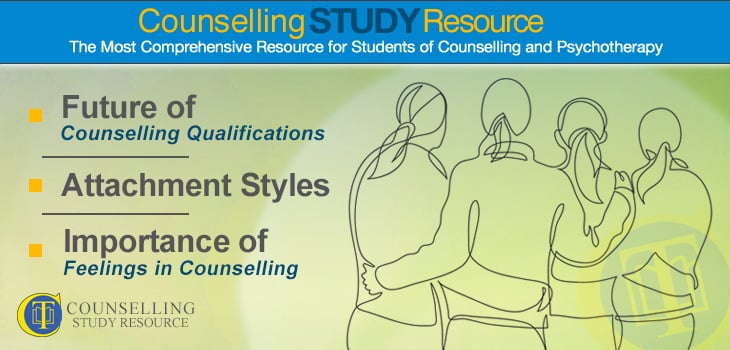103 – Attachment Styles
Future of Counselling Qualifications –Importance of Feelings in Counselling
In episode 103 of the Counselling Tutor Podcast, Ken Kelly and Rory Lees-Oakes talk about the future of counselling qualifications. Next – in ‘Practice Matters’ – Rory describes attachment styles. Last, the presenters discuss why we focus on feelings (as opposed to narrative/story) in counselling.
Future of Counselling Qualifications (starts at 1.40 mins)
The British Association for Counselling and Psychotherapy (BACP), British Psychoanalytic Society (BPC) and UK Council for Psychotherapy (UKCP) have together put out for consultation the SCoPEd framework. This makes proposals for the future of counselling and psychotherapy qualifications in the UK.
Qualifications in this field have already changed significantly over recent years – with Rory recollecting that the practice level of qualification when he did his training 16 years ago was a level 3 diploma.
It seems likely that the minimum qualification level – currently level 4 – will continue to rise over time. In many other countries, a bachelor’s (or even master’s) degree is already needed.
SCoPEd proposes a three-tier framework for counselling and psychotherapy qualifications. It’s important to remember that – even if it does go ahead – this would be introduced gradually and apply to new students, not to those who have already qualified.
Just as the regulation of counselling has been discussed for many years without any significant changes implemented, the SCoPEd proposals may not occur, at least not for some time.
Do have a read of the framework, and have your say: the consultation is a chance to tell the contributing bodies what you think and want.
Remember too that it’s important to supplement your qualification (whatever level) with continuing professional development (CPD).
Attachment Styles (starts at 11.13 mins)
Rory discusses attachment styles – how we relate to others, based on our childhood experiences with our caregivers.
This is a topic that is often raised in our Facebook group, where you’ll find over 23,000 others involved in the world of counselling and psychotherapy.
It is vital that you are aware of your own attachment style in order to be fully available to clients: if your attachment style and theirs clash in some way, this can cause difficulties unless you can recognise what is happening. For example, it could lead you to mis-attune to, withdraw from or even dismiss a client.
Even if you have done personal-development work to tackle an insecure attachment style in yourself, it is easy to slip back into this when you are under stress.
Importance of Feelings in Counselling (starts at 14.40 mins)
The purpose of feelings in humans is self-protection: we use them to keep ourselves safe, as the part of the brain that triggers feelings ensures we react immediately to any danger.
However, it can be hard to express feelings in words – and sometimes even to accept that certain feelings exist within us. Thus, we may hide them not only from others but even from ourselves, pushing them down and out of awareness.
In this way, our thoughts and feelings may be out of sync with each other – we often hear clients talking in therapy about what they ‘should’ be thinking or feeling.
Counselling can help to bring feelings into awareness, setting them free and accepting them without judgement. Once something is in awareness, we then have the ability to change it. Thus, feelings offer us a gateway to the real self.
Because of the difficulties of putting feelings into words, metaphor can be a really powerful tool in counselling. Rory has delivered a lecture on working with metaphor; you can view this here.


